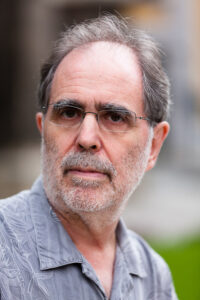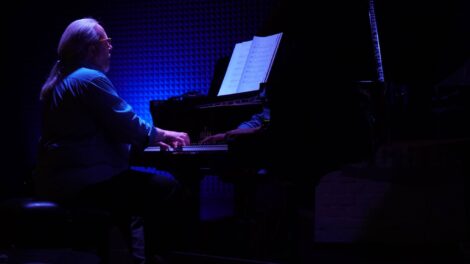Pioneering musician Joshua Rifkin accepts Lafayette residency
By Bryan Hay
Joshua Rifkin, whose musical explorations revived interest in ragtime composer Scott Joplin and reimagined the accepted performance practice of J.S. Bach’s choral works, will be in residence at Lafayette College for the 2023-24 academic year to help mark the 40th anniversary of Williams Center for the Arts.
A Juilliard- and Princeton-trained musicologist, conductor, performer, scholar, and professor of musicology and ethnomusicology at Boston University, Rifkin has been named the Wendy and Alan Pesky ’56 Visiting Artist-in-Residence.

Joshua Rifkin
“Given that it’s the 40th anniversary of the Williams Center and that Hollis Ashby and Ellis Finger (current and former artistic and executive directors of the Williams Center) have done such eclectic programming there, I thought, ‘What one individual could we bring to celebrate this important part of Lafayette’s culture?’” says Anthony Cummings, Eugene H. Clapp II ’36 and Maud Millicent Clapp Professor of Music.
“Who could symbolize all of that? I can’t think of anyone better than Joshua Rifkin,” adds Cummings, who enjoys a longstanding professional and personal relationship with Rifkin. “He’s incredibly versatile—some may remember the albums he arranged for Judy Collins. He has so many different arrows in his quiver.”
Rifkin is eager to begin his residency at Lafayette.
“The Lafayette community, with its lively students and distinguished faculty, offers a singular chance to explore new ideas and transcend boundaries,” he says. “I expect us all to surprise and stimulate one another—and have immense fun doing so.”
Beginning in September and extending into the spring 2024 semester, those explorations will include coursework on Franco-Flemish composer Josquin Desprez, considered one of the most influential masters of the high Renaissance style of polyphonic vocal music; Heinrich Schütz, who brought Italian polyphony into Germany and laid the foundation for the Baroque era in central Europe; and J.S. Bach, whose music was greatly influenced by Schütz.
Rifkin’s list of scholarly publications has particular emphasis on Josquin, Schütz, and J.S. Bach.
In one of the boldest and most memorable shake-ups in modern classical music history, Rifkin in the 1980s posited that Bach’s choral music, particularly his monumental Mass in B Minor, was meant to be performed by one singer per part because of its vocal complexity and orchestration.
His interpretation offered crystalline textures and clarity. Up until that point, Bach’s choral works in the 19th and 20th centuries were traditionally performed with large-scale choruses, following the Romantic tradition established by Beethoven in his Ninth Symphony.
Flipping through Bach’s Mass in B Minor score, his favorite composition, Cummings, an early music specialist, says he’s still awed by Rifkin’s sparse recordings of Bach’s music.
“I always say it’s like looking through a trellis to see this transparent kind of texture,” he says. “It hasn’t persuaded everyone. But I’ve noticed that, as each year goes by, more and more people are convinced by this kind of interesting interpretation.”
The Bach Ensemble, which Rifkin founded in 1978, won Britain’s Gramophone Award for its groundbreaking recording of the Mass in B Minor, and also recorded many of Bach’s cantatas following the one-voice-per-part thesis.
Rifkin’s residency also will include public performances and lectures, interactions with Lehigh Valley performing arts organizations, and workshops with student vocalists and ensembles.
His coursework will extend beyond the Department of Music, including discussions around Joplin. Discussions are underway with the Department of Languages and Literary Studies to join with Rifkin to examine the use of German poetry by German composers of the 17th, 18th, and 19th centuries.
A planned performance of Schubert’s “Die schöne Müllerin” by Rifkin and American tenor Frank Kelley might occasion a literary discussion around Wilhelm Müller, the Prussian author who created the poetic cycle.
Rifkin will spend considerable time exploring the music of Joplin, the Texas-born African American composer whose music Rifkin has demonstrated as being comparable in importance to masterpieces in the European classical tradition. He introduced Joplin to receptive American and global audiences with his 1970 release of three volumes of “Piano Rags by Scott Joplin” on Nonesuch Records. The collection is part of the Grammy Hall of Fame.
When Rifkin is on campus, he will be associated with the Max Kade Centre, which is celebrating its 20th anniversary this year, and the Max Kade Haus, which is celebrating its fifth anniversary this year, adding another celebratory dimension to his residency.

